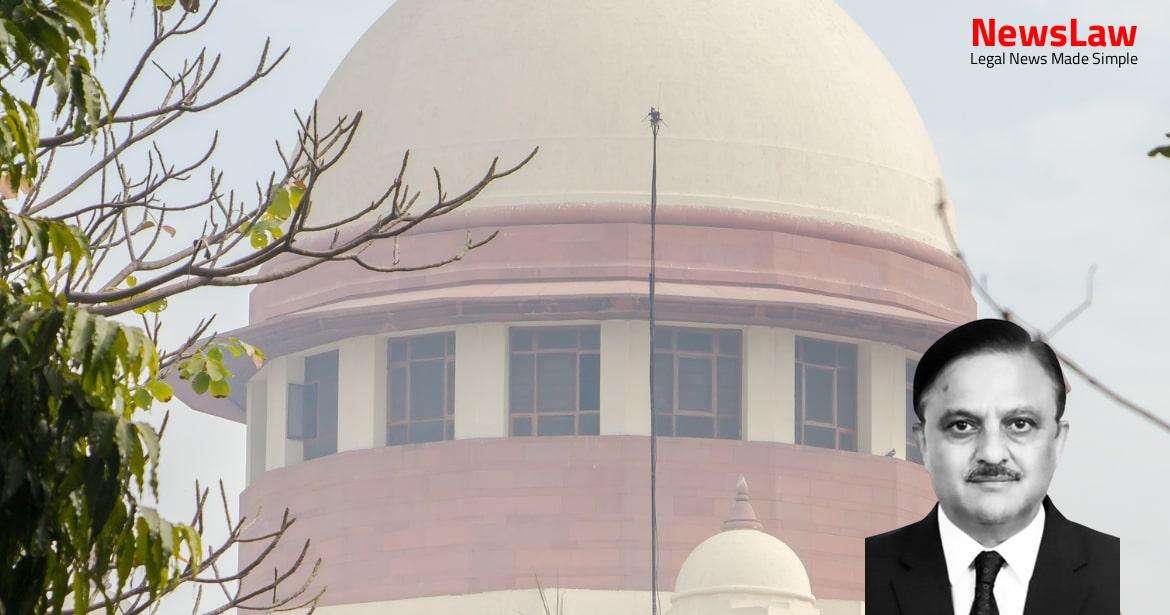In a significant legal development, the Supreme Court has delivered a landmark judgment in the case involving Abdul Raoof against COFEPOSA Wing. The court’s decision to quash the detention orders due to non-supply of essential documents underscores the importance of upholding constitutional principles and protecting individual rights. This case sets a precedent for ensuring proper representation and adherence to the rule of law in matters of judicial review.
Facts
- On 24 May, 2022, the Central Government confirmed the detention order of the detenue for one year from the date of detention.
- Documents requested by the detenus were not supplied, significantly impacting their rights under Article 22(5) of the Indian Constitution.
- A Division Bench of the High Court, in a separate judgment, dismissed the Writ Petition filed by the appellant (sister-in-law of the detenue), upholding the detention order against the detenue issued under COFEPOSA.
- The detenue’s unaccompanied baggage was found to contain contraband gold on 20 April, 2021.
- The advisory board’s opinion led to the confirmation of the detention order.
- The detention order issued against Abdul Raoof on 24 August, 2021, was upheld by the High Court in a judgment on 24 January, 2023.
- Detention orders were issued against three co-accused persons on 24 August, 2021.
- The appellant filed a Writ Petition challenging the detention order and confirmation of detention on grounds of non-supply of relevant documents.
- The detenue reached India on 27 December, 2021, and repeatedly requested information on any detention order issued against him.
- The detenue was arrested on 5 March, 2022, served with the detention order, and provided with the grounds of detention on 7 March, 2022.
- The detenue requested various documents not provided to him, including audio recordings of voice messages from WhatsApp conversations relied upon by the Detaining Authority.
Also Read: MBBS Seat Allocation Case: Supreme Court Rules in Favor of Meritorious Candidates
Issue
- The test for a detained person to make a representation at the earliest opportunity is whether the provided information is sufficient for them to do so.
- When grounds are given that have a rational connection with the purposes mentioned in section a of the Act, the first condition is considered to be satisfied.
Also Read: Judgment in the Case of Altercation During Marriage Procession: Supreme Court of India
Arguments
- The grounds of detention for the detenue in this appeal are identical to those of the co-detenue Mr. Biju V. Joy and two others whose detention was set aside by the High Court.
- Previous decisions cited by the respondent’s counsel stating that documents requested in these cases need not be provided cannot be accepted as they are based on different facts.
- The detention order should be quashed because of the failure to supply the necessary materials for an effective representation.
- Mr. Nachiketa Joshi, counsel for the Union of India, supported the decision of the Division Bench of the High Court distinguishing previous cases.
- The learned counsel for the petitioners also cited relevant judgments that electronic information must be provided in the same format.
- The High Court held that non-supply of documents affected the detenus’ rights and quashed detention orders on this basis.
- The detenue in this case also requested copies of WhatsApp chats.
- The detention orders of the present detenue and others were found to be almost identical to those quashed in a previous case.
Also Read: Contempt of Court: Upholding Individual Liberty in the Case of R.Y. Raval vs. State of Gujarat
Analysis
- The Coordinate Division Bench of the High Court observed the reliance on certain documents in the detention order which impacted the decision-making process of the detaining authority.
- The importance of predictability and certainty in judicial jurisprudence was highlighted to avoid conflicting judgments in the legal system.
- Judicial fraternity was reminded of the duty to uphold constitutional principles and protect individual rights with discipline and adherence to the rule of law.
- The necessity of providing essential documents for an effective representation by the detained individuals under Article 22(5) of the Constitution was underscored.
- Non-supply of WhatsApp chats and other relevant documents was viewed as a violation of the detenus’ right to make a meaningful representation seeking release.
- The Division Bench’s decision to disregard the findings of a previous Bench regarding the importance of supplying documents to detenus was criticized for not following established legal principles.
- The WhatsApp chats containing crucial information about the detenus were specifically mentioned as necessary documents that should have been provided for an effective representation.
- The detenue’s request for WhatsApp chats in electronic form to understand and offer explanations was highlighted as essential for upholding their rights.
- The failure to provide requested documents, despite their importance in the detention process, was viewed as a breach of the detenus’ fundamental rights.
- The need for judicial commitment to constitutional ideals and the duty to ensure the satisfaction of both the detaining authority and the detained individuals in the legal process was emphasized.
- The detaining authority first makes a decision and passes an order.
- The detained person is then given an opportunity to present their objections, which usually occurs at a later stage in cases of preventive detention.
- Even though the grounds considered sufficient by the Government to pass the judgment, additional details may need to be provided to the detained person to enable them to make their representation against the order.
- This process is considered to be the true measure of the procedural rights of the detained person under Article 22 (5).
- The right to make a representation implies the obligation on the detaining authority to provide the grounds or materials on which the detention order was based.
- Division Bench of the High Court should have followed the view taken by another Division Bench of the same High Court when the grounds of detention and challenge were identical
- If the Division Bench disagreed with the earlier decision of the Coordinate Bench, it should have referred the matter to a larger Bench
Decision
- The present appeal is allowed based on a specific ground.
- The order of confirmation of the detention order dated 24 May 2022 by the Central Economic Intelligence Bureau, COFEPOSA Wing is quashed and set aside.
- The order of detention dated 24 August 2021 passed by the Central Economic Intelligence Bureau, COFEPOSA Wing is also quashed and set aside.
Case Title: SHABNA ABDULLA Vs. UNION OF INDIA (2024 INSC 612)
Case Number: Crl.A. No.-003082-003082 – 2024



